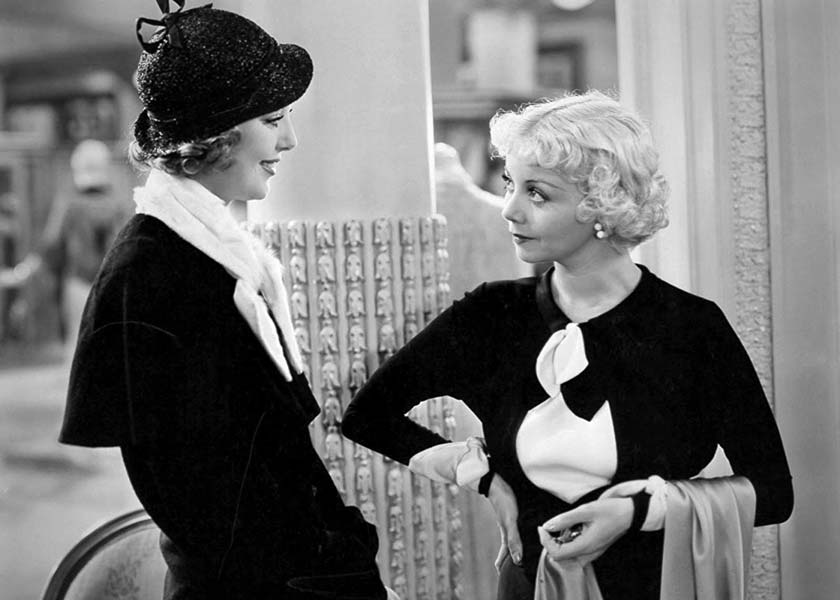Synopsis
Department store manager Kurt Anderson (William) runs his store his own way. He expects to control everybody associated with the operation, including the members of the board of directors. In his personal relationships, he is equally controlling. To get a job, poor girl Madeline (Young) has to sleep with him. Martin West (Ford), Kurt's assistant and protégé, is devoted to Kurt and the job, as Kurt expects. However, after Martin meets Madeline, he falls in love and secretly marries her.
Due to the Great Depression, the store has lost business, and the board wants to use the decline as an excuse to get rid of Kurt. Kurt recruits Polly (White), a sexy employee, to entice Monroe (Hamilton), the board member most determined to remove him, into a scandalous affair. At a party, Madeline gets intoxicated and ends up spending another night with Kurt. The next day, remorseful, she takes poison. Martin rushes to her and forgives her. They plan to move away and start over. Kurt, disappointed in Martin's weakness, dismisses him from his thoughts and, overcoming Monroe and the board, retains control of the store.
Discussion
Employee's Entrance is a highly effective film that presents
ruthlessness in business and personal relationships as an acceptable and
successful lifestyle. William engages in sexual promiscuity for his pleasure and
in sexual blackmail to retain his position at the store; he is effective and
unrepentant at both. Young sleeps with William before and after her marriage. She
is remorseful, but he rejects weakness. Always in control, William gets what
wants; his unscrupulousness does not make him a good
man but achieves
positive results. In contrast, Ford chooses love and home rather than continue as
William's coldblooded protégé. William, uncompromising and forceful,
regards Ford as weak and foolish. At the conclusion, William retains his power and
position, unabashed and unpunished.
Employee's Entranceshowcases the risqué plot lines, amoral characters, and fast-paced, snappy dialogue typical of Warner Bros. films in the Pre-Code era, which was the period between establishment and enforcement of the Motion Picture Production Code. Adopted by the Motion Picture Producers and Distributors of America (MPPDA) in 1930, the Code was a set of moral guidelines meant to restrict profane, blasphemous, violent, sexual and otherwise cynical content from being shown in films. Initially, motion picture producers followed the code on a voluntary basis. In 1934, the MPPDA established an enforcement office, the Production Code Administration, which issued certificates of approval, and by mid-1934 the Code was being strictly enforced. Films made during the lax Pre-Code era of 1930 to mid-1934, such as The Bachelor Father, Blondie of the Follies, Hat Check Girl, A House Divided, The Kiss Before the Mirror, Ladies They Talk About, Laughter in Hell, The Maltese Falcon, Safe in Hell, She Had to Say Yes and Ten Cents a Dance, often contain sexual references, violent events, and levels of cynicism that would have been forbidden or, at minimum, greatly softened, until the Code's influence finally waned in the late 1950s.
Warren William had an authoritative screen presence; not handsome, but suave, skillful, and self-confident. William had been a leading actor on Broadway for ten years before he went to Hollywood and began his film career in 1931. Nearing forty, he had a few years as a leading man, equally effective in drama and comedy. Enforcement of the Production Code diminished the forcefulness of his screen characters, and, an older star, he moved into roles as detectives or district attorneys that made the most of his urbane demeanor and self-assurance.
Wallace Ford, born in England, spent his childhood in orphan asylums in London and Toronto and in a succession of foster homes in Winnipeg, Canada. At age thirteen, he fled the last foster home and joined a vaudeville company, the Winnipeg Kiddies, in 1911. He toured in stock and in 1919 scored a hit in a Chicago production of Booth Tarkington's Seventeen. Ford continued his success after transferring to New York where he had leading roles in several Broadway plays between 1921 and 1929. He played Abie in the highly successful production of Abie's Irish Rose (1922) for 56 straight weeks until he tired of the repetition. Ford moved to Hollywood in 1930 and received leading and character roles from major studios. After a period in England during the mid-1930s, he returned to Hollywood playing mostly character parts for the remainder of his career.
TCM Film Festival, 2014
Employee's Entrance was shown as part of the
Special Presentations
theme at the 2014 TCM Classic Film Festival. The
guest speaker was Bruce Goldstein, director of repertory programming for Film
Forum theater in New York City. According to Goldstein, in the early 1930s
producers ignored the Production Code and hoped to lure audiences with salacious
stories. Soaked in the depths of the Great Depression, these films are
lean and mean,
with no wasted scenes, and characterized by slangy, racy,
machine gun
dialogue spoken by a new crop of stars.
Further Reading

